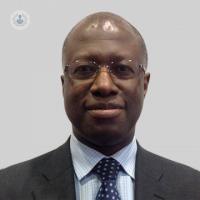Hydrocele in adults: is excess fluid in the scrotum dangerous?
Written by:A hydrocele presents as a swelling in the scrotum. They are fairly common. It is excess fluid in the sack that surrounds the testis. The testis sits in a sack called ‘tunica vaginalis’. There is always a small amount of fluid in this sack, which acts as a shock absorber. A hydrocele happens when the lining of the sack produces too much fluid.
Here, renowned urologist Professor Francis Chinegwundoh MBE explains the signs of hydrocele in men, whether it might be a cause for concern and when it needs to be treated.

What causes hydrocele?
Why the excess fluid should happen is unclear, in the majority of cases. Some hydroceles, however, develop due to a problem with the testes. For example, inflammation of the testes, injury or occasionally a tumour. Such a hydrocele is termed a secondary hydrocele.
How can men check for a hydrocele from home?
Generally, the swelling is painless, but can cause discomfort if the hydrocele becomes large. Any swelling in the scrotum that the man notices on self-examination, should be checked out by a doctor. There are several causes of scrotal swelling, some more serious than others. After physical examination an ultrasound is required to make the diagnosis.
How is it treated in adults?
Hydroceles are not dangerous. They only need treating if causing discomfort or it reaches such a size that it is unsightly.
Just draining the hydrocele with a needle is not done as the fluid soon re-accumulates. The treatment of choice is surgery to remove the fluid and stitch the sack in such a way that the fluid does not re-accumulate. It is not a major operation. Generally, it is done as a day case under anaesthesia.
Why does the fluid re-accumulate in a hydrocele after being drained?
The fluid reaccumulates after drainage alone because nothing has been done to address the underlying problem of overproduction of the ‘shock-absorbing’ fluid produced by the inner layer of the tunica vaginalis or its continued dissemination. During surgery the sac is turned inside out and sutured to itself behind the testis. Fluid produced by the sac is absorbed by veins lining the the inside of the scrotum.
After treatment, how likely is it that the hydrocele will return?
Once treated it is unlikely to recur.
If you are concerned about any lumps or swelling with your testis, do not hesitate to book an appointment to see Professor Chingewundoh via his Top Doctor's profile here.


